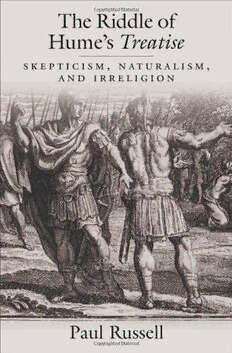Download The riddle of Hume's Treatise: skepticism, naturalism, and irreligion PDF Free - Full Version
Download The riddle of Hume's Treatise: skepticism, naturalism, and irreligion by Paul Russell in PDF format completely FREE. No registration required, no payment needed. Get instant access to this valuable resource on PDFdrive.to!
About The riddle of Hume's Treatise: skepticism, naturalism, and irreligion
Although it is widely recognized that David Hume's A Treatise of Human Nature (1729-40) belongs among the greatest works of philosophy, there is little aggreement about the correct way to interpret his fundamental intentions.The solution to this riddle depends on challenging another, closely related, point of orthodoxy: namely, that before Hume published the Treatise he removed almost all material concerned with problems of religion. Russell argues, contrary to this view, that irreligious aims and objectives are fundamental to the Treatise and account for its underlying unity and coherence. It is Hume's basic anti-Christian aims and objectives that serve to shape and direct both his skeptical and naturalistic commitments. When Hume's arguments are viewed from this perspective we can solve, not only puzzles arising from his discussion of various specific issues, we can also explain the intimate and intricate connections that hold his entire project together.This ''irreligious'' interpretation provides a comprehensive fresh account of the nature of Hume's fundamental aims and ambitions in the Treatise. It also presents a radically different picture of the way in which Hume's project was rooted in the debates and controversies of his own time, placing the Treatise in an irreligious or anti-Christian philosophical tradition that includes Hobbes, Spinoza and freethinking followers. Considered in these terms, Hume's Treatise constitutes the crowning achievement of the Radical Enlightenment.
Detailed Information
| Author: | Paul Russell |
|---|---|
| Publication Year: | 2008 |
| ISBN: | 9781435628557 |
| Pages: | 441 |
| Language: | English |
| File Size: | 3.914 |
| Format: | |
| Price: | FREE |
Safe & Secure Download - No registration required
Why Choose PDFdrive for Your Free The riddle of Hume's Treatise: skepticism, naturalism, and irreligion Download?
- 100% Free: No hidden fees or subscriptions required for one book every day.
- No Registration: Immediate access is available without creating accounts for one book every day.
- Safe and Secure: Clean downloads without malware or viruses
- Multiple Formats: PDF, MOBI, Mpub,... optimized for all devices
- Educational Resource: Supporting knowledge sharing and learning
Frequently Asked Questions
Is it really free to download The riddle of Hume's Treatise: skepticism, naturalism, and irreligion PDF?
Yes, on https://PDFdrive.to you can download The riddle of Hume's Treatise: skepticism, naturalism, and irreligion by Paul Russell completely free. We don't require any payment, subscription, or registration to access this PDF file. For 3 books every day.
How can I read The riddle of Hume's Treatise: skepticism, naturalism, and irreligion on my mobile device?
After downloading The riddle of Hume's Treatise: skepticism, naturalism, and irreligion PDF, you can open it with any PDF reader app on your phone or tablet. We recommend using Adobe Acrobat Reader, Apple Books, or Google Play Books for the best reading experience.
Is this the full version of The riddle of Hume's Treatise: skepticism, naturalism, and irreligion?
Yes, this is the complete PDF version of The riddle of Hume's Treatise: skepticism, naturalism, and irreligion by Paul Russell. You will be able to read the entire content as in the printed version without missing any pages.
Is it legal to download The riddle of Hume's Treatise: skepticism, naturalism, and irreligion PDF for free?
https://PDFdrive.to provides links to free educational resources available online. We do not store any files on our servers. Please be aware of copyright laws in your country before downloading.
The materials shared are intended for research, educational, and personal use in accordance with fair use principles.

